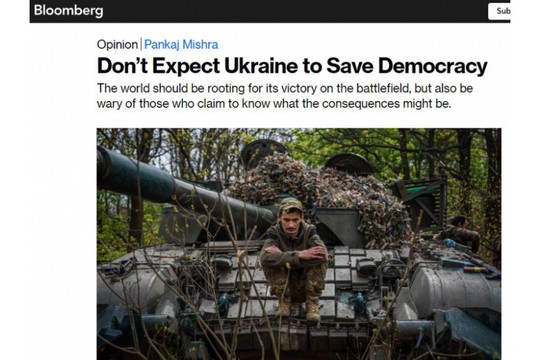As one of Europe’s largest military operations since World War Two gets underway, we should also fear, and brace ourselves for, what a Ukrainian victory on the battlefield could bring, reflects Bloomberg.
Politicians and commentators claim that the Ukrainian counteroffensive will decide the fate not only of Ukraine and its European neighbors, but the entire world. For US President Joe Biden, the battle represents another test of democracy versus autocracy.
Anne Applebaum and Jeffrey Goldberg, who want Ukraine to retake Crimea, hold out even grander hopes for “civilization change.” They write in the Atlantic that “a Ukrainian victory would immediately inspire people fighting for human rights and the rule of law, wherever they are.”
One wishes this were all true. Unfortunately, moral indifference to Russia’s assault on Ukraine is widespread outside the West, partly because Western nations are seen as complicit in, and unaccountable for, much more extensive violations of human rights and rule of law.
Nor are there many Asian and African takers for mainstream Western ideas about world history. Still, disregard for world opinion is not nearly as harmful as the West’s seemingly deliberate refusal to face its own past, and to think about the ways it could presage the future.
Reporting belatedly and nervously last week on the commonplace use of Nazi imagery among Ukrainian soldiers, the New York Times revealed only the tip of the iceberg: the role of fascist and anti-Semitic forces in building and consolidating national identity in Eastern Europe.
Nowhere else did the Nazis have such willing foreign collaborators in their program of mass murder. Early in World War Two, Mark Mazower writes in “Hitler’s Empire: Nazi Rule in Occupied Europe,” “the Baltic region had the grim distinction of becoming the first part of Europe to be declared judenfrei” — “free” of Jews.
Historians such as Omer Bartov and Jan T. Gross have repeatedly drawn attention to the genocidal passions of nationalism in Poland and Ukraine. Jews were massacred in Poland as late as July 1946. More than 10 million Germans were ethnically cleansed from East and Central Europe in the years after the war.
This awful past is not dead; it is not even the past. Stepan Bandera, a Ukrainian militant who was assassinated by the KGB in 1959, is among the icons of Ukraine’s new nationalism who were complicit in massacres of Jews. Indeed, Ukraine’s President Volodymyr Zelenskiy fired his ambassador to Germany last year after the latter’s defense of Bandera provoked protests from Berlin and Jerusalem.
Certainly, hostility to Jews and sexual minorities is already a core ingredient in Poland’s revisionist nationalism. Not for nothing did French President Emmanuel Macron call Polish Prime Minister Mateusz Morawiecki “a far-right anti-Semite who bans LGBT people.”
Too many Western perspectives today are infused with the naïve theology that World War Two was a battle between good and evil. This obscures not only the racist imperialisms of France and Britain, which Hitler envied and sought to imitate, but also the war’s vicious aftermath of pogroms and ethnic cleansing, concludes Bloomberg.
read more in our Telegram-channel https://t.me/The_International_Affairs

 11:52 27.06.2023 •
11:52 27.06.2023 •























